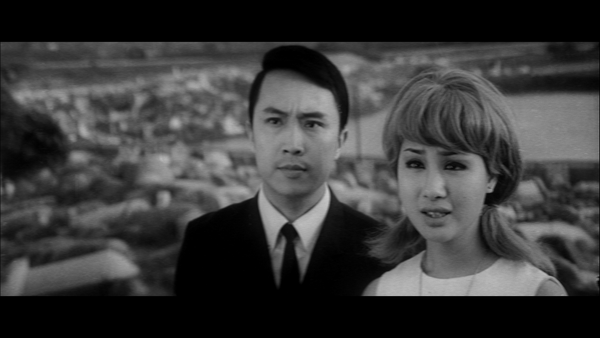Back to Anping Harbor
回來安平港
Tainan Longsheng Film Company
Executive Producer: Xu Bingding (許丙丁)
Producer: Xu Shengfu (許勝夫)
Director: Wu Feijian (吳飛劍)
Screenplay: Gao Ge (高歌)
Cinematography: Liao Qingsong (廖慶松)
Lighting: Cai Sanji (蔡三吉)
Sound: Lin Kunqi (林焜圻)
Composer: Xu Shi (許石)
Editor: Huang Qiugui (黃秋貴)
Cast: Yang Lihua (楊麗花), Wei Hong (韋弘), Wei Shaopeng (魏少朋)
1972 - Black and White - 100 minutes
Synopsis
This romantic family melodrama reworks the Madame Butterfly story in Anping, the port attached to Tainan city in southern Taiwan. Xiuqin (Yang Lihua) falls for a Dutch ship’s doctor called Daley (Wei Hong), and becomes pregnant. When he has to leave, he promises to return, but never does. Xiuqin brings up her red-haired daughter, Kim (Yang Lihua) by herself. Kim falls for a medical student from Taipei, Zhiqiang (Wei Shaopeng), who is about to go to the USA for his studies. Is destiny about to repeat itself? A twist of fate involving the long-lost Dr. Daley intervenes to deliver an unexpected ending.
Commentary
Back to Anping Harbor is a complex and ambitious film with a demanding double role for Yang Lihua, one of Taiwanese-language cinema’s biggest stars. Made in 1972, it is a fitting climax to the second wave of Taiwanese-language cinema, after which the industry went into steep decline and soon ceased altogether. The second wave featured diversification of genres. Melodrama was among the most popular, and Anping Harbor possesses the genre’s key characteristics. But unlike the country-and-city melodramas of economic development like Early Train from Taipei – also featured in the Taiwan’s Lost Commercial Cinema season – Back to Anping Harbor also has a more cosmopolitan focus, suggesting that its anxieties are less about Taiwan’s domestic situation and more about its place in the world.
Back to Anping Harbor was inspired by a hugely popular late 19 th century song of the same name, sung in the film by lead actress Yang Lihua. The screenplay version draws from two variants of the melodrama genre – the Hollywood family melodrama and the Chinese family melodrama. In the Hollywood form, young members of the family chafe against the constraints imposed upon them by older, and often, ailing members. An intruder figure can ruin or redeem the family. In this case, Daley is the intruder and young love runs into opposition from Xiuqin’s father, who is in debt and under pressure to marry her off to someone else. The narrative drive of the Chinese family melodrama is produced by conflicting duties. Put the Hollywood and Chinese traditions together, and Xiuqin is caught between love and duty to her father, and suspense revolves around whether Daley will do the right thing.
Because he is a foreigner, there is a question mark over whether Daley even knows what the right thing is. Marked as a reworking of the Madame Butterfly narrative, Anping Harbor raises anxieties about how the world is treating Taiwan. 1971 was the year the Republic of China government based on Taiwan lost the China seat at the U.N. to Mao Zedong’s People’s Republic. The plot also resonates with the island’s colonial history. Surely it is no accident that Daley is Dutch, the nationality of the island’s early colonisers, and that the man who tells him he must leave is Japanese, the nationality of the most recent colonisers? And is it a mere coincidence that Kim’s medical student boyfriend is going to study in the USA, which the Taiwan government of the time saw as the island’s protector?
Without wanting to give away the ending, how Back to Anping Harbor twists the Butterfly story not only resolves the tension between the Hollywood family melodrama, with its emphasis on individual freedom, and the Chinese family melodrama’s emphasis on duty. It also says a lot about Taiwan’s anxieties concerning how the world, and in particular the USA, is treating it. At the same, it expresses Taiwan’s hopes and its outward-looking orientation.
In Back to Anping Harbor, star Yang Lihua turns in a virtuoso performance by playing both Xiuqin and her daughter, the mixed race, red-haired Kim. Yang was already established as a performer in the local Taiwanese gezaixi opera, where she specialized in male roles, before she started to star in films in the late 1960s. In our Taiwan’s Lost Commercial Cinema season, Yang also stars in Vengeance of the Phoenix Sisters, where, Mulan-style, she cross-dresses as she goes out to seek revenge for her murdered parents. After the eclipse of the Taiwanese-language cinema, Yang starred in Mandarin-language films for a few more years. But it is as a gezaixi opera performer that her fame has continued to this day, and she is recognized as a Taiwanese living cultural treasure. Co-star Wei Hong, who plays Daley, also acted in both Taiwanese and Mandarin-language films, and appeared in at least 140 films over a long career.
Taiwan-born director Wu Feijian had directed numerous Taiwanese-language films since his debut in 1964. By the time he made Back to Anping Harbor, he was a reliable stalwart of the industry, but when it was eclipsed, so was his career. While his female lead’s career continued, Back to Anping Harbor was the climax of his directing career.
Booking via website required.
Text source and photocredit: https://taiyupian.uk/




